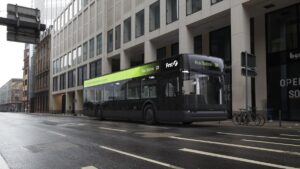As business winds down at a delivery van depot in Bristol, vehicles head to cleaning bays and electric ones go to the recharging bay as the fleet parks up for the night.
One van, though, is an oddity. Slightly futuristic in look, it picks its way round the depot, looking for all the world as if it is driven by a super-cautious operative.
The van is the first prototype to come out of the research and engineering facility in Banbury of Arrival, Britain’s newest automotive company. And it doesn’t have a driver at all in the conventional sense of the term.
Robopilot is running fully in autonomous mode, blazing a trail as it does so. The day is coming when dozens of electric, autonomous vans in the depot park themselves and, at the start of the next working day, present themselves at the loading bay ready for a human driver to turn up for work and head out on to the open road.
Arrival is a British company backed by Denis Sverdlov, a 42-year-old Russian billionaire. Springing out of computers at a design studio in Kensington, west London, it is going into production of vans for UPS, the delivery company, and buses for FirstGroup in Oxfordshire. Via a reversal into an American shell company, it is valued at $6.3 billion in New York.
The business has four production sites preparing for action, one in Bicester, two in the Carolinas in the United States and one in Madrid. It employs 2,200 people even before a vehicle is commissioned.
Arrival’s Robopilot has pushed the possibilities of unmanned automotive technology in commercial vehicles with the help of £13 million of British taxpayer support from the Centre for Connected and Autonomous Vehicles.
Avinash Rugoobur, Arrival’s chief strategy officer, believes that what is achievable autonomously also applies to its buses, which are due on Britain’s roads — not in self-driving mode — next year. “The autonomous technology is immediately addressable inside the controlled environment of a depot which does not change its form or layout,” he said. “Customers will get immediate operational and safety benefits. It removes complexity at the end of a working day.”
This is not the only thing that marks out Arrival in the move away from pollution-emitting commercial vehicles. It is pioneering the microfactory, ripping up production models of the automotive industry that have lasted for a century. “This is an industry which historically relied on billions of dollars of capital expenditure on plants over hundreds of acres that take three years to go into commission, with expensive steel-stamping plants and paint shops,” Rugoobur, 40, said. “The operational efficiency of the conventional automotive plants has been maxed out. We are doing things differently.”
Arrival is taking buildings of 20,000 sq m that might ordinarily have been warehouses. Its vehicles are made from a pre-prepared, pre-coloured super-lightweight polypropylene glass-fibre composite, the sort of stuff that moulded plastic chairs are made of. It is taking battery modules from LG, of South Korea, and making battery packs itself. All of which is designed to make the cost of such vans something like affordable.
After recent filings on the Nasdaq exchange that indicated start-up losses this year of about €130 million with capital expenditure at up to €225 million, Arrival has confirmed that its vans are being tested with UPS and will go on to British road trials after Christmas.
Its plant in Bicester will start production in the second half of next year on the way to making 10,000 vans a year for UPS and Leaseplan, a Dutch fleet manager, for the roads in Britain and Europe. Its Banbury R&D centre is producing 12m buses for FirstGroup ready for a trial in the next quarter and service in the spring of 2022. It aims to have a new microfactory in the area from which it plans to make a thousand buses a year.
“The key to the microfactory model is how rapidly production can be scaled up,” Rugoobur said, explaining that because of their lack of size these faciltities could be located in urban areas where the demand would be and could be up and could be running within six months.
“We can order equipment rapidly and can respond to demand. We could go from our current four microfactories to fifty very quickly, changing sizes, format and variants of the vehicles to any number of markets and customers.”
Read more:
Self-driving electric vans and buses arrive in UK
















